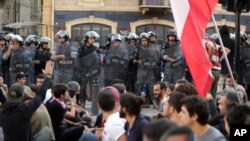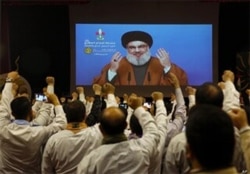After three weeks of largely peaceful anti-government protests in the streets of Lebanon, demonstrators are shifting tactics and surrounding banks, government ministries and state-affiliated companies. They are holding sit-ins at many of these areas.
Earlier this week, the Lebanese army deployed throughout the country to open roads and highways that had been closed by the protesters. Some estimates say that up to a million people, almost one-fourth of Lebanon’s population, have participated in the protests, calling for an end to corruption and for a solution to Lebanon’s economic crisis.
For Israel, the major question is whether the protests will strengthen or weaken Hezbollah, which is currently part of Lebanon’s government. Hezbollah also has more than 100,000 rockets and missiles that can reach all parts of Israel.
At the beginning of the protests, Hezbollah gunmen tried to stop them. But as soon as the Lebanese army came to help the demonstrators, Hezbollah backed down.
Orna Mizrahi, an Israeli expert on Lebanon at Tel Aviv University’s Institute for National Security Studies (INSS), says that Hezbollah leader Hassan Nasrallah is concerned about the ongoing protests. Mizrahi said she sees three possible scenarios for the future of the protests, one of which is threatening to Israel.
In the first scenario, there is no profound change in Lebanon, despite the resignation of Prime Minister Saad Hariri. There would be a new Cabinet and perhaps slight improvements to the economy, like external aid. She believes this is the least likely development, though, given the fact the protests show no signs of slowing down.
“In the second scenario, there would be a real revolution that would lead to a real change in the existing system,” Mizrahi said in an interview. “It can happen either by quiet non-violent struggle or through a violent struggle. The results will be a more democratic Lebanon but the economic situation will still be difficult.”
A third option, she said, is a new civil war that could become violent. A 15-year civil war that began in 1975 left an estimated 120,000 Lebanese dead. Lebanon’s complex power-sharing structure is meant to ensure against another civil war, but it is a possible scenario nonetheless.
“In that case, Hezbollah will start to interfere and extend its military forces more than it already has,” she said. “It could lead to real chaos in Lebanon for a long time.”
In that case, she said, Hezbollah could strike Israel as a way of consolidating its power in Lebanon, while Israel’s interest is a stable Lebanon without Hezbollah.
“It is important for Nasrallah to show that he is a protector of Lebanon,” Mizrahi said. “We can’t avoid the possibility of a military escalation against Israel maybe as a way to get attention.”
Israeli officials say Hezbollah is a proxy of Iran, and Iran continues to try to expand its influence in the Middle East. It is succeeding in Syria, where Iran and Russia have managed to defeat Islamic State and keep President Bashar al-Assad in power.
Over the past few years, Israel has launched hundreds of attacks on Iranian convoys in Syria and Lebanon that were transporting arms destined for Hezbollah, according to Israeli military officials. In the past few months, it has also expanded these attacks to Iraq. Hezbollah has threatened to retaliate.





